Avoid These Common Leather Care Mistakes for Long-Lasting Shoes that may lead to irreparable harm to your cherished footwear. A prevalent mistake is applying waterproofing spray on smooth leather. While these sprays appear to be a simple solution for safeguarding your shoes, they can prevent vital nutrients from reaching the leather, causing it to dry out and crack over time. Smooth leather shoes possess a natural water-resistant quality due to their grain layer and must be regularly nourished with shoe creams and waxes to preserve their durability and aesthetic. Rather than resorting to sprays, opt for high-quality leather conditioners and wax polishes that not only shield but also feed the leather, promoting its longevity while maintaining its intrinsic qualities.
Master Essential Techniques for Protecting Your Leather Footwear
To extend the life of your leather items, it is crucial to grasp their built-in protective features. Full grain leather inherently possesses natural water-resistant capabilities due to its densely woven fiber structure. However, these properties necessitate regular upkeep to remain effective. The overall resilience of your leather is heavily influenced by the care routine it undergoes. Employing waterproofing sprays can compromise the leather’s breathability, potentially leading to significant deterioration over time if not addressed properly.
Discovering the Unique Advantages of Full Grain Leather
After the tanning process, full grain leather maintains its original surface layer, which offers remarkable natural protection. Products crafted from this material have an intact grain layer, providing superior resistance to water and wear. This top layer is rich in natural oils and fibers, creating a protective shield, which makes additional waterproofing sprays unnecessary and potentially detrimental to the leather’s integrity.
Exploring Leather’s Moisture Management and Aging Process
Grain leather must retain its capacity to both absorb and release moisture effectively. The pores in your leather facilitate its ability to breathe and regulate moisture, keeping it supple and preventing unsightly cracks. However, waterproofing sprays can seal these pores, restricting critical airflow and disrupting the leather’s natural moisture balance. Moreover, as leather ages, it requires sufficient nourishment from conditioning products. When waterproofing sprays are applied, they obstruct the essential oils from penetrating the leather, leading to dryness and brittleness over time. Regular application of leather cream enables your leather to age gracefully, developing a rich and appealing patina.
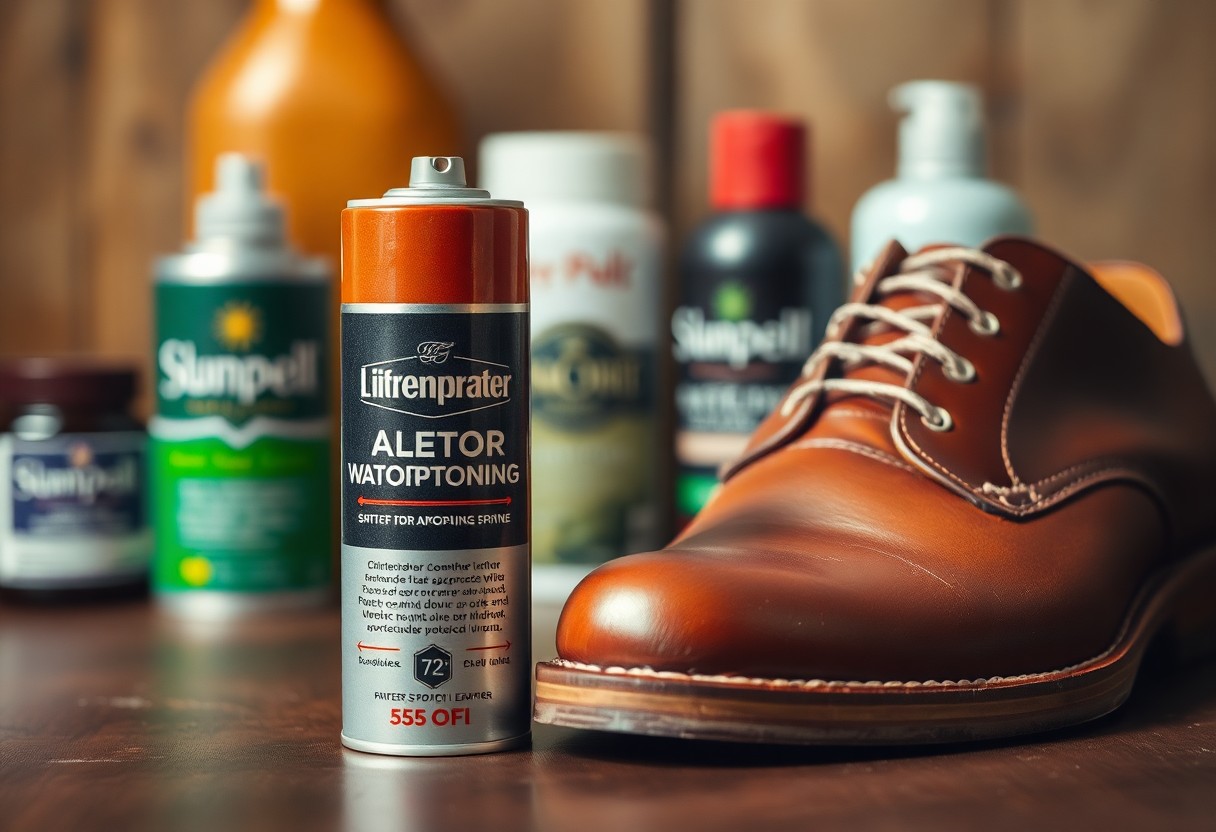
Recognizing and Evading the Waterproofing Spray Pitfall
Many individuals mistakenly assume that waterproofing spray is the ultimate solution for safeguarding their leather shoes, but this widespread practice can lead to significant harm to your footwear. While these sprays create a quick protective layer against water, they simultaneously block essential nutrients from reaching the leather, setting the stage for potential long-term deterioration.
Clarifying Myths Surrounding Leather Care Marketing Practices
Due to aggressive marketing strategies and well-meaning advice from shoe store staff, you may have been led to believe that waterproofing spray is necessary for all types of leather shoes. This misconception has been perpetuated by numerous shoe retailers, primarily motivated by the high profit margins and frequent repurchase rates associated with these products. The reality is that regular smooth leather already possesses inherent protective qualities that do not require additional spray-on barriers for effective safeguarding.
Evaluating Immediate Benefits Against Long-term Impacts
The deterioration of your leather shoes begins when waterproofing sprays create a barrier that prevents essential oils and conditioning agents from entering the leather. Although there may be an initial perception of enhanced water resistance, the truth is that your leather gradually becomes dry and brittle without the necessary nourishment it relies on. The repercussions of using waterproofing sprays on smooth leather extend far beyond superficial protection. Ongoing nourishment is crucial for maintaining the leather’s flexibility and durability. When conditioning creams and oils are unable to penetrate the leather due to the spray barrier, the material becomes susceptible to cracking and degradation, significantly reducing your shoes’ lifespan. Natural waxes and suitable conditioning provide far superior long-term protection while promoting the leather’s health.
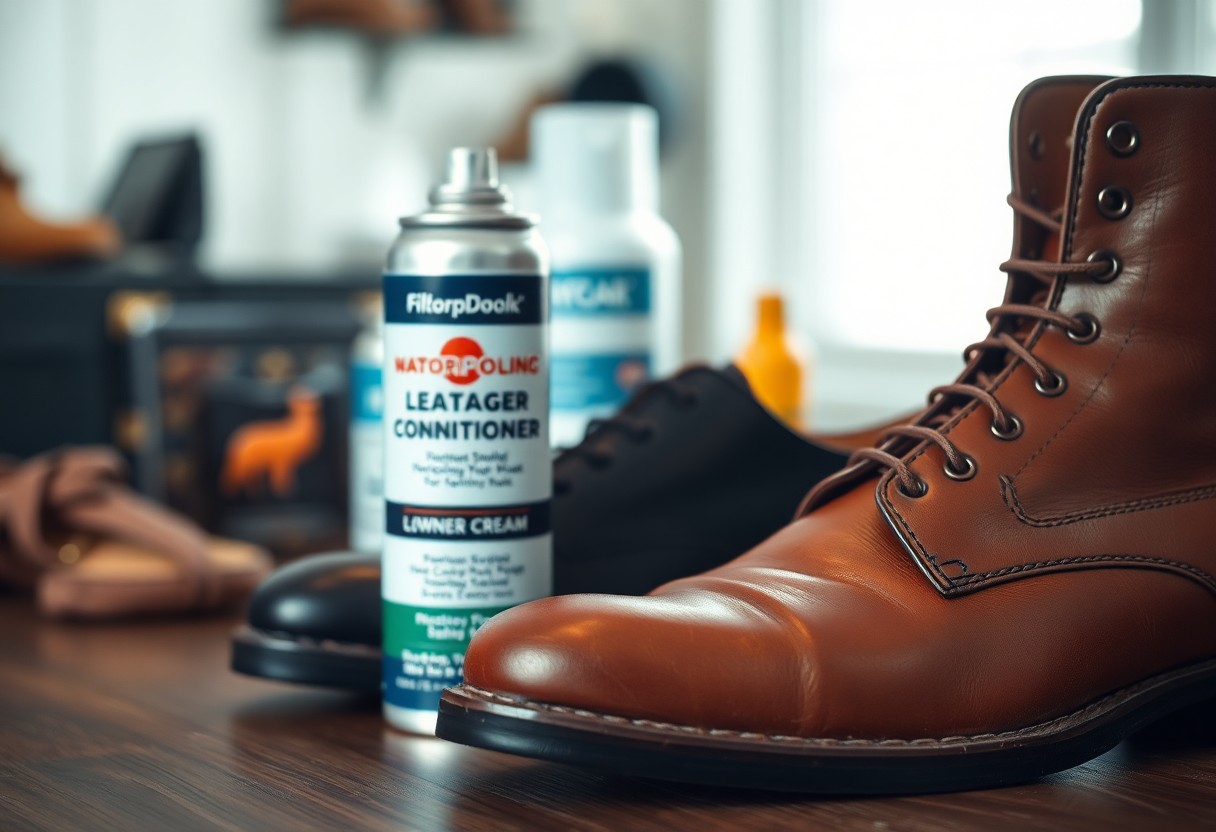
Delving into the Science Behind Effective Leather Care
An integral aspect of proper leather maintenance is grasping its molecular structure. The collagen fiber networks within your leather shoes necessitate both protection and nourishment. When applying products to leather, they can either coat the fibers or penetrate them deeply. This interaction is essential for the long-term health of your leather shoes.
Emphasizing the Importance of Nourishing Leather Regularly
It is vital to acknowledge that your leather shoes require routine nourishment to sustain their quality. The natural oils embedded in your leather shoes help avert cracking and maintain flexibility. Over time, these oils diminish due to regular wear and exposure to the environment. To preserve the structural integrity of the leather, it is essential to replenish these oils through diligent conditioning practices.
Grasping the Barrier Effects Caused by Waterproofing Sprays
A major disadvantage of waterproofing sprays is their propensity to form a barrier. When applied to smooth leather, these sprays create an impermeable layer that obstructs both water and vital nutrients. This barrier hinders your leather care products from effectively penetrating the surface, leading to a gradual decline in the leather’s quality and durability over time.
The barrier effect of waterproofing sprays creates a troubling cycle for your footwear. While these sprays effectively prevent water, they simultaneously obstruct the absorption of nourishing products that are crucial for maintaining the health of the leather. As a result, the leather may appear shielded on the surface but is, in reality, drying out and becoming brittle beneath. Silicone-based sprays are particularly detrimental, as they create a permanent barrier that is difficult to remove without damaging the leather.
Implementing Effective Leather Protection Strategies
Contrary to common belief, your smooth leather shoes require tailored care techniques that align with the natural characteristics of full-grain leather. The most effective approach combines traditional methods with products that enhance the leather’s inherent protective traits, assuring both immediate safeguarding and lasting durability for your footwear.
Uncovering the Benefits of Wax-based Products
A superb alternative to waterproofing sprays is high-quality wax-based solutions. These products work synergistically with your leather’s natural grain rather than against it. Applying wax polish creates a protective layer that still allows the leather to breathe, making it especially advantageous for toe caps and areas subjected to significant wear.
Maximizing the Benefits of Cream and Conditioner Application
Unlike traditional spray treatments, leather creams and conditioners deliver essential nourishment while preserving the leather’s natural protective qualities. Your shoes reap the benefits of oils that deeply penetrate the material, helping to prevent dryness and cracking. Additionally, regular use of cream and conditioner produces a cumulative effect that enhances the leather quality over time. The natural oils found in these products support the leather’s flexibility and strength while allowing it to develop a beautiful patina. It is recommended to apply these products every 4-6 wears to maintain optimal leather condition.
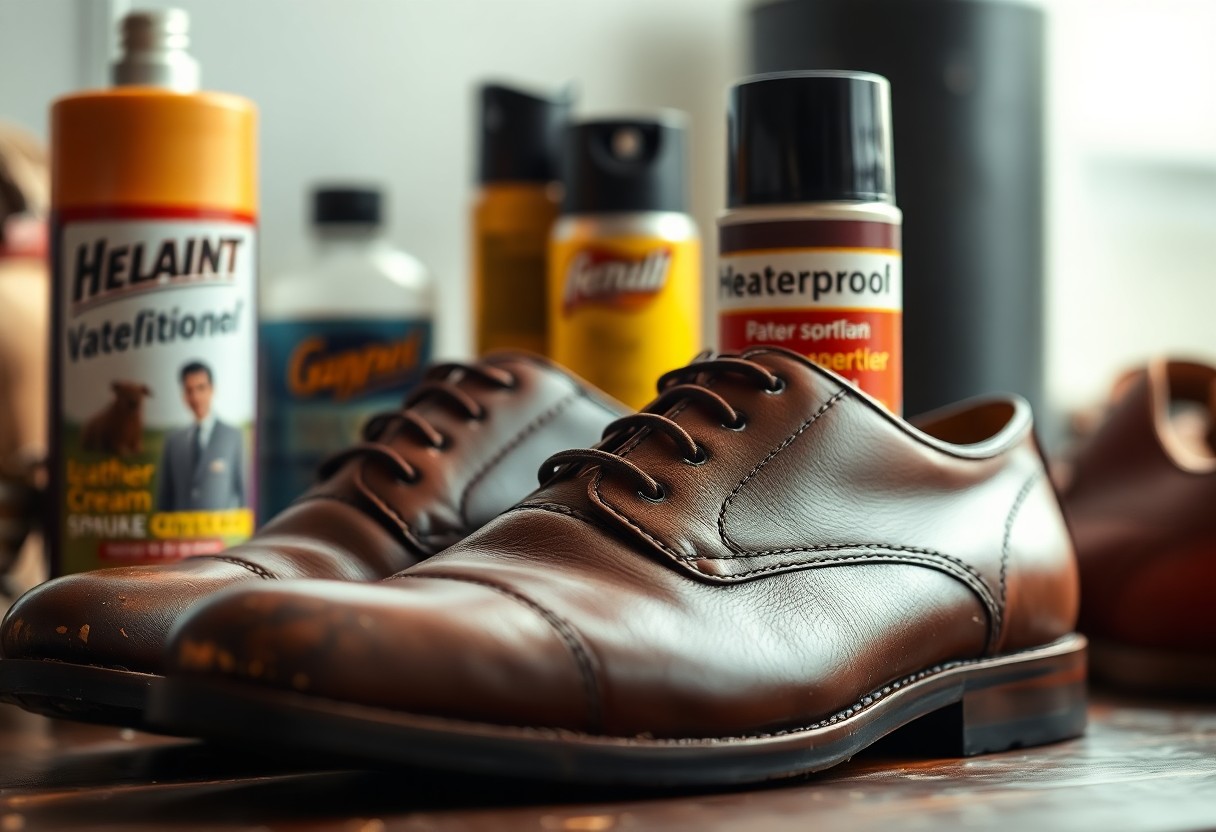
Identifying Appropriate Scenarios for Waterproofing Spray Use
In contrast to smooth leather, certain materials greatly benefit from waterproofing sprays. These products form a highly effective water-resistant barrier on specific materials that lack natural protection. Waterproofing sprays are particularly beneficial for suede, nubuck, and various textiles, where the material structure does not inherently repel moisture.
Enhancing the Water Resistance of Suede and Nubuck
Applying waterproofing spray to your suede or nubuck footwear can significantly boost their resistance to moisture damage. While many contemporary suede materials come pre-treated with factory waterproofing, additional spray applications can help sustain this protection over time. The spray application creates a shield that effectively prevents water from infiltrating these delicate materials.
Providing Specialized Protection for Textile Footwear
Beyond leather alternatives, textile footwear requires specialized protection against water damage. Materials such as canvas, mesh, and synthetic fabrics can achieve enhanced water resistance through proper spray application. Most textile materials are naturally absorbent, rendering them vulnerable to water damage and staining.
Moreover, waterproofing sprays for textiles aid in maintaining the shape and color of your shoes. The barrier they establish also prevents dirt and debris from embedding in the fabric fibers. It is advisable to reapply the spray every 3-4 months for optimal protection, depending on shoe usage frequency and prevailing weather conditions.
Valuable Insights from Experts on Effective Leather Care
Not every leather treatment is created equal. Industry professionals consistently advise against using waterproofing sprays on smooth leather. Your full-grain leather shoes require specialized treatments that allow them to breathe and absorb nourishing solutions. Using unsuitable products can lead to leather damage that may cost hundreds of dollars to repair.
Insights from Tannery Experts on Leather Maintenance
To preserve leather quality, tannery experts emphasize that full-grain leather possesses inherent water-resistant properties in its outer layer. To maintain the leather’s protective qualities, it is crucial to apply oils and waxes. Waterproofing sprays can obstruct these critical treatments from penetrating the leather.
Recommendations from Experienced Cobblers for Long-lasting Care
For sustainable leather care, professional cobblers suggest using wax-based products instead of waterproofing sprays. Your shoes will thrive with treatments that both protect and nourish the leather. Research indicates that 90% of premature leather damage arises from the use of improper care products.
By adhering to proper leather care techniques, your shoes can last an impressive 15-20 years compared to only 2-3 years with inadequate maintenance. Traditional wax treatments enable leather to retain its natural characteristics while offering sufficient moisture protection. Your investment in quality leather footwear merits meticulous care practices that ensure both aesthetic appeal and durability.
Essential Guidelines for Optimal Leather Care Practices
In summary, your smooth leather shoes necessitate appropriate care that avoids waterproofing sprays. Instead, opt for shoe creams and waxes that nourish the leather while providing effective water protection. Full-grain leather inherently possesses protective qualities due to its grain layer, and waterproofing sprays can block essential oils from penetrating the leather, leading to dryness and cracking. Reserve waterproofing sprays for suede, nubuck, or textile footwear, where they can perform effectively. By choosing the right products, you can safeguard your leather shoes while ensuring their longevity.
Frequently Asked Questions About Leather Care
Q: What makes waterproofing spray detrimental to smooth leather shoes?
A: Waterproofing spray creates a barrier on the leather that obstructs essential oils and conditioners from penetrating the material. While it offers some water protection, it restricts the necessary nourishment of the leather, leading to dryness and potential cracking over time, ultimately shortening the lifespan of the shoes.
Q: What alternatives should I consider instead of waterproofing spray on smooth leather shoes?
A: Explore using a combination of shoe cream and wax polish. Shoe cream delivers essential oils to nourish the leather, while wax polish provides a protective layer that helps repel water. This approach works in harmony with the natural protective qualities of full-grain leather, maintaining the leather’s health while ensuring effective water resistance.
Q: Which types of footwear can I safely use waterproofing spray on?
A: Waterproofing spray is ideal for materials such as suede, nubuck, and textiles. These materials lack the natural protection found in smooth leather and, therefore, benefit from the protective barrier formed by waterproofing sprays. Many modern suedes and nubucks may already have factory treatments, but additional spray applications can enhance and sustain this level of protection.
The Article Why you shouldn’t use waterproofing spray on regular smooth leather and better alternatives appeared first on My Shoes Finder
The Article Waterproofing Spray on Smooth Leather: Risks and Alternatives Was Found On https://limitsofstrategy.com
References for Further Reading on Leather Care:
Waterproofing Spray on Smooth Leather: Risks and Alternatives
Waterproofing Spray Risks: Smooth Leather Alternatives Explained
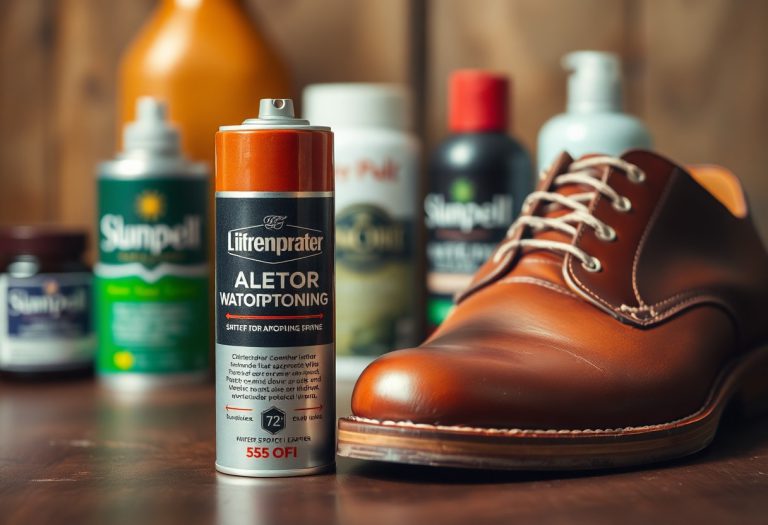


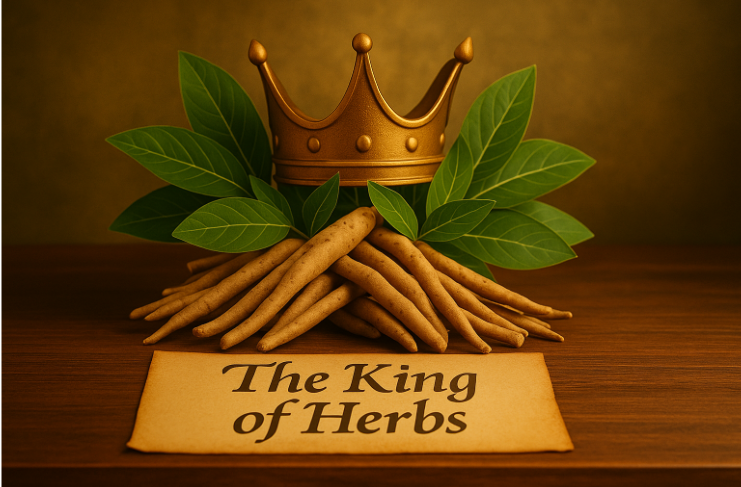
Your insights on leather care are particularly pertinent in today’s fast-paced consumer culture, where quick fixes often seem more appealing than proper maintenance. I’ve made the mistake of using waterproofing sprays in the past, only to realize that over time, my once supple shoes began to lose their luster. It’s fascinating how a bit of knowledge about the materials we invest in—like understanding the properties of full grain leather—can significantly extend their life and aesthetics.